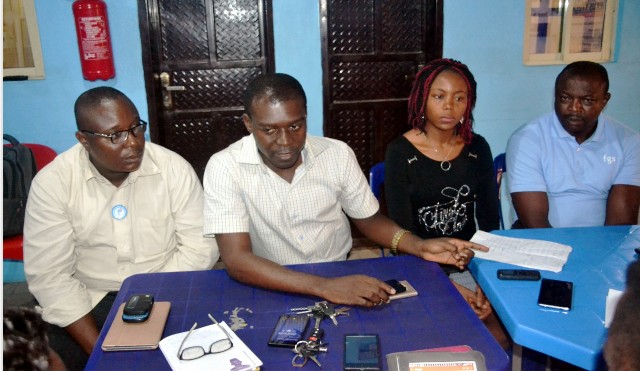Business
Smuggling: FG Should Reduce Import Duty On Vehicles -STOAN

The Seaport Terminal Operators Association of Nigeria (STOAN) has said that the Federal Government’s move to stop smuggling through the ban on importation of vehicles through the land borders should be complemented with a reduction in customs duty.
The spokesman of STOAN, Mr Bolaji Akinola, said this in an interview with newsmen in Lagos, yesterday.
The Tide reports that the Federal Government recently announced a ban on importation of vehicles through the land borders with effect from Jan. 1, 2017.
According to the STOAN spokesman, the move to stop smuggling of vehicles into the country through the ban will not yield the desired result if not complemented with a corresponding reduction in customs duty.
Akinola spoke against the backdrop of the new Vehicle Identification Number (VIN) scheme announced this week by the Federal Government.
“The rate of smuggling in Nigeria especially of vehicles is alarmingly high.
“This is essentially due to the high and prohibitive import duty on vehicle which is more than twice what obtains in other countries in the sub-region.
“While the VIN scheme sounds like a good idea, it may not do much to check smuggling.
“The main antidote to smuggling is the reduction of Customs duty on vehicles to bring it to the level obtainable in other West African countries, ‘’ the STOAN spokesman told newsmen.
He said that the duty should not be more than 10 per cent.
“Why exactly are people landing their vehicles in the ports of neighbouring countries and smuggled into Nigeria?
“It is to avoid the high Customs duties at the ports,’’ Akinola said.
He said it had become difficult to check smuggling through the land borders because of the preponderance of illegal entry routes into the country.
According to him, there are more than 1,600 illegal entry routes into Nigeria.
“The borders are porous. It will be difficult for any agency of government to effectively patrol and check the influx of goods and persons through those porous entry points.
“There is a need to mount barriers and build either strong high walls or electric fences at most of those entry points. Most importantly, government must deploy technology to secure our borders,’’ he told said.
Akinola said that the high rate of import duty on vehicle had shot up the prices of vehicles beyond the reach of many Nigerians as “the prices of vehicles have doubled over the past 18 months”.
“This is due to the high Customs duty, which is 35 per cent plus an additional surcharge of 35 per cent bringing the total government’s tariff to 70 per cent.
“This is way too high and when you place it side by side the high rate of foreign exchange, you see why Nigerians are paying more to acquire cars.
“The ban on importation through land borders is not enough to check smuggling and bring down the prices. Only a reduction of Customs duty will achieve that,” he said.
The STOAN spokesman also said that there were too many government agencies operating at the ports.
According to him, this (presence of many government agencies) is contributing to the high cost of doing business at the ports.
“The high cost of doing business at the port, which many allude to, is not because of high charges by operators but due to high Customs tariff and multiple checks by government agencies.
“Reduce Customs duty, reduce the huge crowd of government agencies operating at the ports and automate the Customs clearing process, which is way too manual and regressive.
“Someone described the Customs clearing process as archaic and way too expensive.
“There are multiple checks within and outside the ports, which must be tackled by government.
“A former Finance Minister, Dr Ngozi Okonjo-Iweala ejected many of the agencies a few years ago but they were all back in their multitude,” Akinola said.
He said that Nigerian ports had ample capacity to handle both imports and exports and to support the Federal Government’s revenue diversification drive.
“There is ample capacity at the ports. Most terminals are operating at less than half their capacities.
“Our ports were vibrant until the Jonathan administration enacted some policies that chased shippers away.
“This government will have its name in gold by reversing those ill-advised policies so as to bring back activities and jobs to the ports,” the STOAN spokesman said.
Transport
Automated Points Concession : FAAN Workers Gave 72hrs To Revise Decisions In PH

Transport
FAAN Announces Pick-Up Points for Go-Cashless Cards

Business
Fidelity Bank To Empower Women With Sustainable Entrepreneurship Skills, HAP2.0
-
Politics2 days ago
2027: NIGERIANS FAULT INEC ON DIGITAL MEMBERSHIP REGISTER DIRECTIVE
-

 Environment2 days ago
Environment2 days agoLAWMA Director Says Sweeping Reforms Have Improved Waste Collection
-
Politics2 days ago
LP Crisis: Ex-NWC Member Dumps Dumps Abure Faction
-

 Politics2 days ago
Politics2 days agoUmahi Dismisses Allegations On Social Media, Insists On Projects Delivery
-

 Sports2 days ago
Sports2 days agoAbia Not Sure To Secure continental Ticket
-
Sports2 days ago
La Liga: Yamal Records First Career Hat-trick
-

 Sports2 days ago
Sports2 days agoCity Survive Leeds’ Challenge At Elland Road
-
Politics2 days ago
IT’S A LIE, G-5 GOVS DIDN’T WIN ELECTION FOR TINUBU – SOWUNMI

